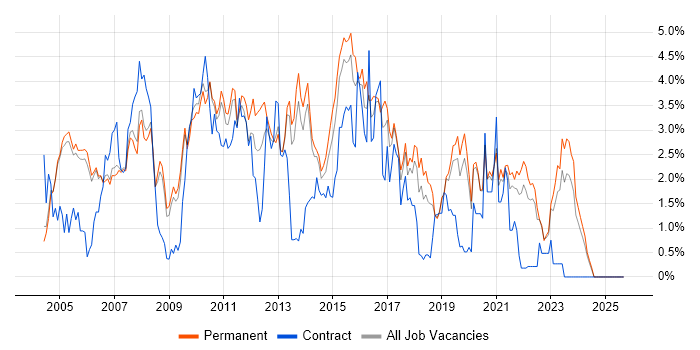Transact-SQL
Oxfordshire > Oxford
The table below provides summary statistics and salary benchmarking for jobs advertised in Oxford requiring T-SQL skills. It covers permanent job vacancies from the 6 months leading up to 17 January 2026, with comparisons to the same periods in the previous two years.
| 6 months to 17 Jan 2026 |
Same period 2025 | Same period 2024 | |
|---|---|---|---|
| Rank | 29 | - | 37 |
| Rank change year-on-year | - | - | +18 |
| Permanent jobs citing T-SQL | 2 | 0 | 7 |
| As % of all permanent jobs in Oxford | 0.80% | - | 2.04% |
| As % of the Programming Languages category | 4.26% | - | 5.69% |
| Number of salaries quoted | 2 | 0 | 7 |
| 10th Percentile | £56,841 | - | £48,500 |
| 25th Percentile | £57,168 | - | £50,000 |
| Median annual salary (50th Percentile) | £58,801 | - | £55,000 |
| Median % change year-on-year | - | - | -4.35% |
| 75th Percentile | £61,524 | - | £63,750 |
| 90th Percentile | £62,504 | - | £71,000 |
| Oxfordshire median annual salary | £54,562 | - | £55,000 |
| % change year-on-year | - | - | +37.50% |
All Programming Languages
Oxford
T-SQL falls under the Programming Languages category. For comparison with the information above, the following table provides summary statistics for all permanent job vacancies requiring coding skills in Oxford.
| Permanent vacancies with a requirement for coding skills | 47 | 107 | 123 |
| As % of all permanent jobs advertised in Oxford | 18.88% | 40.84% | 35.86% |
| Number of salaries quoted | 35 | 69 | 116 |
| 10th Percentile | £48,500 | £43,750 | £41,250 |
| 25th Percentile | £55,000 | £55,000 | £47,500 |
| Median annual salary (50th Percentile) | £60,980 | £62,500 | £55,000 |
| Median % change year-on-year | -2.43% | +13.64% | +4.76% |
| 75th Percentile | £75,000 | £77,500 | £73,750 |
| 90th Percentile | £91,250 | £96,000 | £86,250 |
| Oxfordshire median annual salary | £67,500 | £60,000 | £55,000 |
| % change year-on-year | +12.50% | +9.09% | +10.00% |
T-SQL
Job Vacancy Trend in Oxford
Historical trend showing the proportion of permanent IT job postings citing T-SQL relative to all permanent IT jobs advertised in Oxford.

T-SQL
Salary Trend in Oxford
Salary distribution trend for jobs in Oxford citing T-SQL.

T-SQL
Co-Occurring Skills & Capabilities in Oxford by Category
The following tables expand on the one above by listing co-occurrences grouped by category. They cover the same employment type, locality and period, with up to 20 co-occurrences shown in each category:
